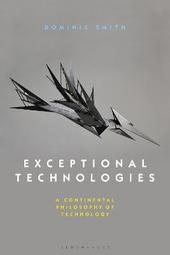
|
Exceptional Technologies: A Continental Philosophy of Technology
Paperback / softback
Main Details
| Title |
Exceptional Technologies: A Continental Philosophy of Technology
|
| Authors and Contributors |
By (author) Dominic Smith
|
| Physical Properties |
| Format:Paperback / softback | | Pages:208 | | Dimensions(mm): Height 234,Width 156 |
|
| Category/Genre | Phenomenology and Existentialism
Philosophy of science
Impact of science and technology on society |
|---|
| ISBN/Barcode |
9781350015616
|
| Classifications | Dewey:601 |
|---|
| Audience | | Tertiary Education (US: College) | |
|---|
|
Publishing Details |
| Publisher |
Bloomsbury Publishing PLC
|
| Imprint |
Bloomsbury Academic
|
| Publication Date |
23 August 2018 |
| Publication Country |
United Kingdom
|
Description
A discussion of the rapidly growing field, from a thinker at the forefront of research at the interface of technology and the humanities, this is a must-read for anyone interested in contemporary developments in Continental philosophy and philosophy of technology. Philosophy of technology regularly draws on key thinkers in the Continental tradition, including Husserl, Heidegger, and Foucault. Yet because of the problematic legacy of the 'empirical turn', it often criticizes 'bad' continental tendencies - lyricism, pessimism, and an outdated view of technology as an autonomous, transcendental force. This misconception is based on a faulty image of Continental thought, and in addressing it Smith productively redefines our concept of technology. By closely engaging key texts, and by examining 'exceptional technologies' such as imagined, failed, and impossible technologies that fall outside philosophy of technology's current focus, this book offers a practical guide to thinking about and using continental philosophy and philosophy of technology. It outlines and enacts three key characteristics of philosophy as practiced in the continental tradition: close reading of the history of philosophy; focus on critique; and openness to other disciplinary fields. Smith deploys the concept of exceptional technologies to provide a novel way of widening discussion in philosophy of technology, navigating the relationship between philosophy of technology and Continental philosophy; the history of both these fields; the role of imagination in relation to technologies; and the social function of technologies themselves.
Author Biography
Dominic Smith is Lecturer in Philosophy at the University of Dundee, UK.
ReviewsSmith's critical reconsideration of the transcendental in technoscientific life seems to mark out a promising way forward. * Notre Dame Philosophical Reviews * In Exceptional Technologies, Smith offers a completely new take on philosophy of technology via the tradition of transcendental thought in continental philosophy. He shows us how usual notions of contemporary philosophy of technology, usually conceived as wedded to the empirical turn, can be revitalised when technology is thought in relation to the transcendental. By using the example of exceptional technologies - such as failed inventions, artworks with impossible aims and other marginalised technologies - Smith has produced a book that is insightful, exciting, entirely compelling and a must read for anyone interested in staying at the cutting-edge of philosophy and media theory in the contemporary era. -- Timothy Barker, Senior Lecturer in Digital Media, School of Culture and Creative Arts, University of Glasgow, UK Dominic Smith offers a timely study, just when the popular empirical turn in technoscience studies is beginning to feel more constraining than liberating. He presents no "reification of Technology" of the sort empiricists oppose. Instead he recommends a transcendental analysis of "general conditions" in technoscientific life whose presence is just as empirical as any artifact's. What makes Exceptional Technologies original and noteworthy, however, is Smith's discussion of "exceptional" (i.e., failed) technologies. Precisely as exceptional, he argues, they are uniquely effective reminders that generally accepted conditions are what typically go unnoticed when we are happily preoccupied with concrete technologies that work. -- Robert C. Scharff, Emeritus Professor of Philosophy, University of New Hampshire, USA In this important contribution to the philosophy of technology, Smith engages with some of the most interesting topics in media and technology, from photography, to the Internet, and even the humble sheet of paper, that most helpful technology for the writing of philosophy. Advocating for a renewed sense of the transcendental, Smith focuses on the conditions of possibility that structure and define any given technology, both successful technologies and failed ones, hypothetical devices and impossible ones. Such marginal or paradoxical exceptions come to define what technology is, and, most importantly, what technology might become. -- Alexander R. Galloway, Professor of Media, Culture, and Communication, New York University, USA
|